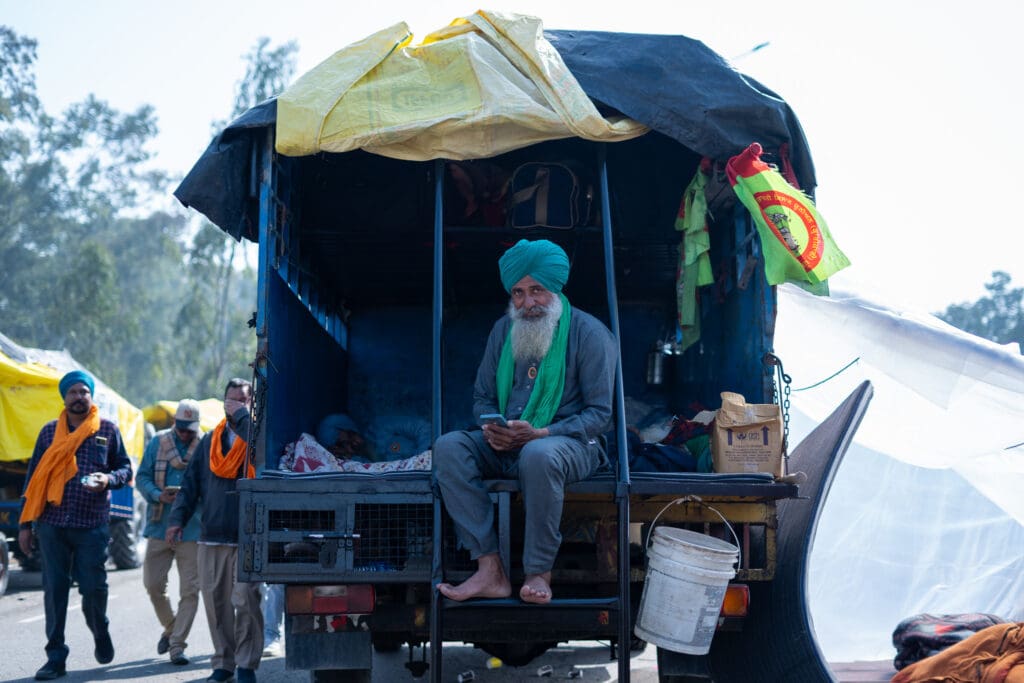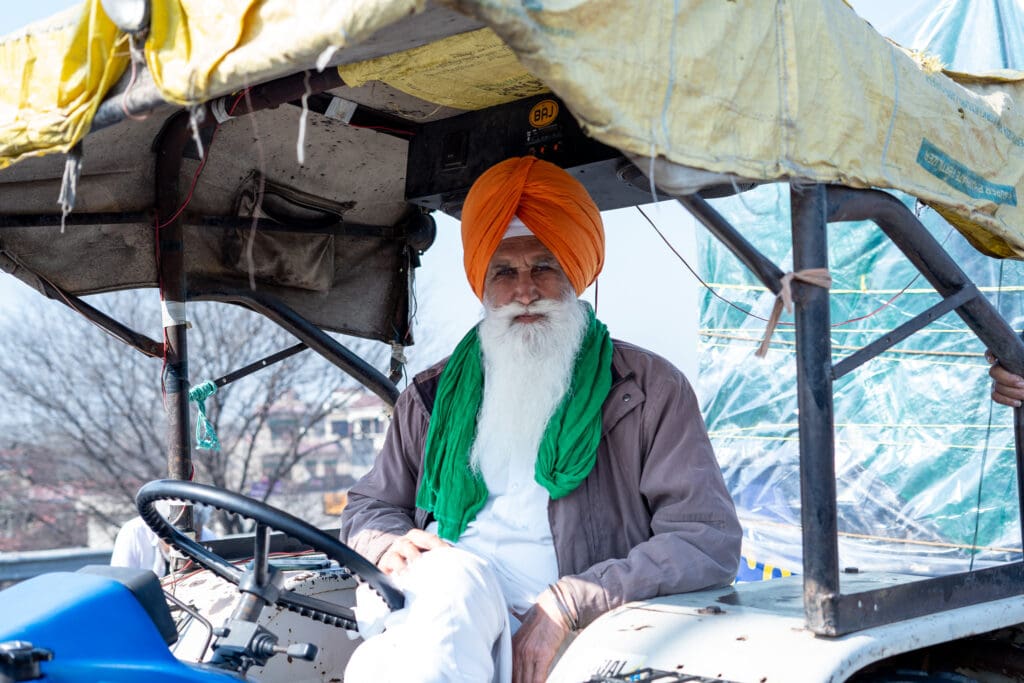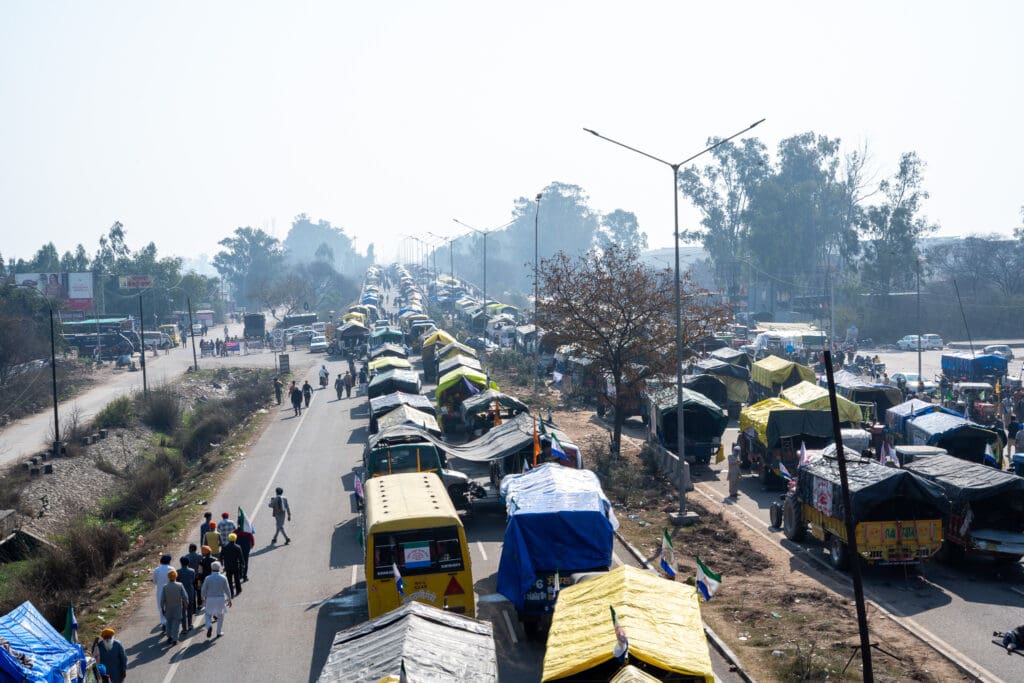
At Shambu border, a bridge divides farmers and the state. It is fortified with cement walls, spikes, barbed wires and containers. On the Haryana side, the government is hell-bent on not letting the farmers move ahead to Delhi, their destination. On the Punjab side, thousands in their tractors and trolleys are determined to bring the state to its knees by pressing their demands.
The standoff continues as talks remain inconclusive.
On February 13 morning, farmers from Punjab commenced their ‘Delhi Chalo’ march that was violently clamped down by Haryana Police at the border. Pellets and rubber bullets were fired at the farmers when they tried to breach the roadblocks. Drones were used to drop teargas.
At least three farmers have lost their eyesight from pellets fired by the police. Dozens, including journalists, were injured during the clash. By night farmer groups declared a “ceasefire” as talks progressed on the sideline.
Kilometres long convey to Delhi now camps on the highway, invoking the scenes of the 2020-2021 historic farmer protest at Delhi borders that forced the union government to revoke three controversial farm laws.
“It is easier to go to Pakistan,” mocks Ranjan Singh from Punjab’s Batianda who blames Narendra Modi’s Bharatiya Janata Party for the notorious attack made by Haryana to stop farmers from marching to Delhi. While Punjab and Delhi, both ruled by the Aam Aadmi Party, are in favour of the farmers, they have BJP-governed Haryana in between.


Ranjan, a local pradhan (chief), says a hundred men from his village have joined the convoy and others will also join soon. He said their demand for legal guarantees of a minimum support price (MSP) can resolve the farmer crisis.
“We were at Singhu too,” the elderly said, resonating with all the other farmers Maktoob met during the visit. Singhu, on the Delhi-Haryana border, became the protest site in 2020 for the 16 km-long stir that completed almost a year.
MSP and other demands
Samyukta Kisan Morcha (Non-Political) and the Kisan Mazdoor Morcha have declared that over 200 farmer unions are part of their new stir. Farmers say they will be joined by others when they reach Delhi. A debt waiver and MSP are the main points in the demand charter that also seek compensation for the deaths during the 2020 protest.
Over 700 died due to harsh weather during the first spell of the protest. Farmers are also asking for the withdrawal of cases registered during the last agitation.


“They haven’t returned our tractors. Modi promised cases would be resolved but our men remain jailed,” a protesting farmer told Maktoob.
Farmers are asking for the MSP formula to be set along the lines of recommendations of the MS Swaminathan Commission which submitted its report in 2006. According to the suggested formula, MSP should be set at 50 per cent over the cost of production.
The list of demands also includes pensions for farmers, loan waivers and withdrawal from the World Trade Organisation where India is facing pressure over its subsidies to farmers.
Farmers are also against the privatisation of the electricity sector. State governments currently provide subsidised electricity to farmers, which helps bring production costs down.
The charter also seeks justice in the case against the son of a union minister accused of running his car over farmers in Uttar Pradesh’s Lakhimpur Kheri district in October 2021.
Prepared for a long halt
Farmers at the protest site told Maktoob that they are prepared for everything “just like last time.” The trolleys are stuffed with rations and food is served every ten metres at the Shambu border. Medical volunteers with equipped ambulances are also stationed at the site.
“We will not leave,” a group declared.
Within days, laundry lines are put up outside the trolley. While the frontline is live with men in colourful turbans and different flags shouting slogans and listening to speeches, men in the trolleys resort to chats and card games.
Only a few women are present at the protest. When asked about the absence, farmers said they would join in Delhi.
On the other side, hundreds of paramilitary forces and police personnel are camping with orders to seal the border. They also make sure even the canal below the bridge is monitored. Internet remains shut down in Haryana’s bordering towns, taking a toll on livelihood. While locals complain about the situation they are cautious not to blame the farmers.
“We are all coming from farming families. They are only asking for it for their survival,” a Taxi driver from Ambala said. “Even police will say the same. Only the BJP is against them.”
Trains and buses are affected by sealing the strategic highway.
“We didn’t block the road. Police did,” a farmer controlling the frontline of the protest, said. “We don’t want to stay here. We are waiting for what our leaders are saying. If our demands are not met, We will go to Delhi soon.”
Modi’s government is considering giving in to the demands of farmers as they would avoid another farmer protest just weeks before the general elections.



